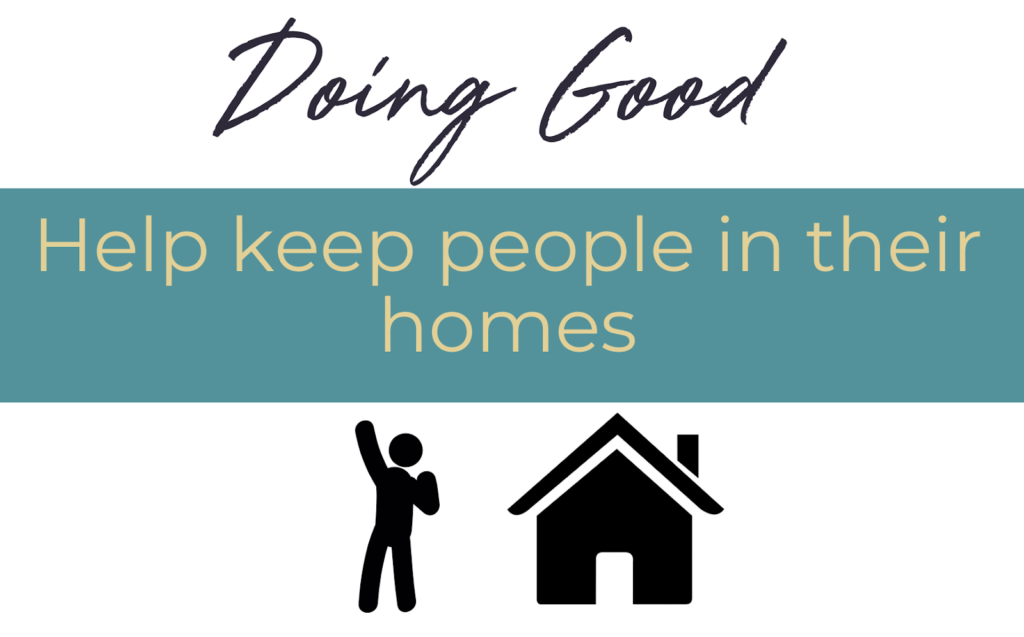One of the biggest money relationships anybody will get into in their life is buying their house. In fact, owning your own home has been shown to be a tipping point for building financial stability and generational wealth.
Yet, many homeowners out there hit rough patches. Unforeseen circumstances (like, say, a global pandemic and unexpected unemployment) arise and payments that were made easily every month suddenly become difficult.
Homeowners shouldn’t have to lose their home if they’ve experienced a rough patch/challenging time period.
This is where Note Investors can step in and make a direct and massive impact in both someone’s life. This impact ripples into the community as well as future generations.
This is why we invest in Notes.
While we seek high returns to work toward our redefined version of retirement, we also want our investment dollars to do good in the world. We should be able to direct our resources to do good in the world while making communities and families stronger. All while also making a high return. Why not?
In this article, you’ll learn 5 reasons that passive real estate investors can make the world a better place through note investing. They are:
- Promote generational wealth and financial stability
- Provide a personal connection that empowers homeowners
- No institutional red tape that delays and deters homeowners from staying on track.
- Avoid Foreclosures
- Help Keep People in Their Homes
First, let me start with a mindset paradigm shift.
Money as a Tool For Good
Most people think of money as a strictly transactional tool that we use to buy essentials, luxuries, toys, vacations, and more. We buy the stuff we use.
But money can also be used to build communities, spiritually engage, or build relationships.
For instance, we use money to pay taxes that go toward uplifting our town. We donate money to charities that we know are doing important and meaningful work. And we start businesses together and forge deep and meaningful relationships that ultimately can change the world.
Our money provides the foundation for the actions that change the world.
As a real estate investor, we possess a lot of potential to use our money to make the world a better place. We don’t have to blindly put money into a stock portfolio to support companies who may not align with our values.
Investing in stocks may actually mean I’m supporting a company that pollutes, an ethic of human labor exploitation, or a culprit of systemic racism.
Yuck.
This is why we prefer to invest where we know our money can uplift and do good. We invest in real estate secured notes.
Changing a Life Through Real Estate Secured Notes
First, note investing is the paper side of real estate. We go into a deeper definition in our How Note Investing Works Video. Notes involve a lender and a borrower. The note owners (you and operator) lend money to a borrower to help them work toward home ownership.
We focus on investing in non-performing notes because this is the point where someone is about to lose their home (and it is the best scenario for the return on our investment). And we have the ability to potentially reverse that course of action.
Before we describe how we can do that, we need to understand this pivotal moment.
#1: Promote generational wealth and financial stability
The home is often that borrower’s biggest asset. (And we all know the power of assets over liabilities from Robert Kiyosaki’s book, Rich Dad Poor Dad). And it all starts here.
Much different from renting, a homeowner often treats that asset with respect, care and diligence. Pride of ownership empowers people. The asset earns appreciation and the equity built becomes increasingly valuable.
The path to home ownership also leads to generations of wealth.
Perhaps this homeowner is the first in the family to actually have qualified for a loan. A history of racial bias in mortgage lending may mean that several generations of this family were denied the opportunity to grow any kind of future wealth through homeownership.
Two specific consequences arise from lack of homeownership that can cripple the financial stability of future generations. First, a family will have fewer resources in retirement without owning their own home. They may have to pay inflated rents, or not be able to draw upon the equity built up in the home.
Second, the wealth transfer that typically occurs from parents to children is more likely to be minimal or non-existent without the wealth built through homeownership. The next generation experiences homeownership disparities that reinforce wealth inequality.
Simply stated, home-owning parents increase a child’s likelihood of owning a home later in life.
Other financial benefits for the next generations also occur, like:
- Seeing first-hand the benefits to homeowners through watching parents pay mortgages and care for an asset.
- Passing down knowledge about the mortgage application process.
- Gaining a stronger motivation to obtain homeownership
- Have parental support in the form of a down payment, or have the motivation to save for a down payment earlier in life.
Buying a home is more than just a place to live. It is a decision that has ripple effects into the future. When homeowners experience difficult times, it isn’t just the borrower who may benefit from assistance.
#2: Provide a personal connection that empowers homeowners.
The ability to work directly with homeowners allows note investors to create a plan that is personalized to the homeowner’s unique situation.
The relationship between a borrower and a lender is already a mutually beneficial one. Both parties get exactly what they want.
The homeowner gets a house they love, increasing financial stability with equity growth and wealth to pass down to future generations. The bank or lender gets a predictable, low-maintenance and secure way to get a return on their money in the coming years.
But you aren’t a bank.
What I love about being an individual that lends out money to homeowners in the form of real estate secured note investing, is that I can play a role in this mutually beneficial relationship. And I can do it in a way that is more personal and adaptable, allowing me to help more people keep their homes.
If I purchase a real estate note and my borrower is having a hard time with making payments, I can talk to them (through a qualified lawyer). We can adapt the loan accordingly to their specific needs so that we both win. They can continue to make payments sustainably and pay down their balance. I get more reliable cashflow and, often, a better return on my investment.
What bank or government will do that?
By being an individual that lends money for people to buy houses, I am in control of how to get the best outcome from that borrower. I can be more agile and creative. I can make better decisions at my smaller scale than a large bank would with their red tape and concrete policies.
As it turns out, this is better for the borrower as well.

#3: No institutional red tape that delays and deters homeowners from staying on track.
Most lending institutions do not have systems in place to modify and adapt a loan after it is originated. Refinancing a home may offer similar benefits, but this takes more money, time, and a knowledge of the process.
Homeowners have no choice.
When they have trouble making payments, homeowners often stop paying and start accruing even more debt through large fees. Institutions either move straight to foreclosure, or let the homeowner build more and more crippling debt.
Now, a homeowner is distressed not only financially, but mentally as well as the debt grows.
As a note investor, we can intervene and offer new solutions without the institutional red tape. We even have the ability to wipe away someo the debt since we purchased the note at a steep discount.
We can take steps that empower the borrower to keep up their progress, not add to the drowning weight of debt.
#4: Avoid Foreclosures that Cripple Wealth Building Potential and Decrease Neighborhood Home Prices
Where homeownership increases the likelihood of financial stability, foreclosure reverses that trend as a borrower’s credit tanks. Banks lose money because they can not act quickly and borrowers are stuck with a bad record and the loss of confidence from any progress that was made.
Additionally, foreclosures can even bring down neighborhood home price values creating a cascade of negative impacts in the local market.
We see perfectly good homes vacant and in pre-foreclosure for years. This contributes to depreciation as the home sits in disrepair and neighbors find their property values decrease.
As a note investor and individual mortgage lender, we cannot avoid foreclosures 100% of the time, but the vast majority of the time, we can avoid foreclosures. This leads to far better outcomes for the borrowers and the communities we service.
#5 Help Keep People in Their Homes
Our favorite exit strategy when we invest in notes is to get a non-performing note to re-perform. We describe that in detail in our Ultimate Guide to Note Investing.
Basically, it means we help a borrower get back on track with payments. We can alter the loan terms to help the borrower keep their home, keep building equity in their biggest asset, and even ignite increased financial wealth for generations to come.
Bottom line – this is why we invest in notes.
And because we love win-win scenarios so much, this is also the exit strategy that gives us the highest return on our investment while still being secured through real estate (the home).
Of course, this doesn’t happen every time, but we use specific criteria when purchasing a note that helps us find notes where this might work. We focus on three categories in our extensive due diligence process:
- The asset (home). This involves getting boots on the ground, a quality fair market value assessment, and a full neighborhood and regional market report.
- The paper. This entails reviewing any and all documentation associated with the note, the mortgage and the asset, and following up on anything strange or missing.
- The borrower. Through legal and ethical means, we look for clues in the borrower’s history that may indicate they want to keep the home and get back on track.
With this focus, we can serve more people, both our borrowers and our capital partners.
Best Case Scenario for the Homeowner and the Investors: A Win-Win
When borrowers can stay in their home we see a ripple effect of good.
- Their credit is preserved, making future purchases easier
- They maintain the home with more attention, often leading to higher home values for the neighborhood.
- They avoid costly moving fees, or even better, avoid homelessness.
Conclusion
Our borrowers have way more opportunity to keep their homes, get a second chance at pulling their finances and life back together and keeping their communities intact, all while we are able to maintain our returns and secure our investment.
We feel liberated with knowing exactly how our investment dollars are uplifting the lives of others. There are hearts and families at both ends of a real estate secured note investment. Stocks, crypto, even multifamily syndication investments don’t come close to having that kind of tangible impact for us.
We strongly believe our investment dollars ought to do good in the world. We should be able to direct our precious resources to make communities stronger and help people while also making a high return. It is possible.
We love investing in notes because it changes people’s lives, creates opportunities where there wouldn’t have been one otherwise, and gives most people the second chance they deserve when things get tough. And, of course, we don’t see returns this high anywhere else in real estate investing.


0 Comments